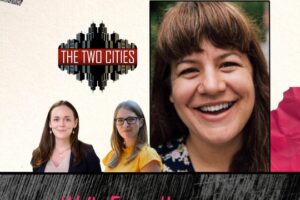Alt txt: image of our guest, Dr. Eric Harvey, along with two of our co-hosts, Stephanie Kate Judd and Dr. Madison Pierce, along with the title of the episode: “Blindness in the Hebrew Bible with Dr. Eric Harvey.”
In the second episode of our series on disability, we discuss blindness in the Hebrew Bible with Dr. Eric Harvey, who holds a PhD from Brandeis University in Near Eastern and Judaic Studies, with a specialization in Bible and the Ancient Near East. Dr. Harvey also recently held a digital humanities post-doctoral fellowship at the center for spatial and textual analysis at Stanford University, and he blogs at blindscholar.com. Throughout our conversation, Dr. Harvey shares his personal story of becoming legally blind during his doctoral studies, and how his experience led him to reassess the construct of blindness in the Hebrew Bible. In particular, he addresses the passages that use the saying “having eyes, but not seeing” in the Psalms, Jeremiah, Ezekiel, and Isaiah, highlighting how the line itself does not pertain to the same reality (sometimes it relates to moral disobedience and idols, and only once does it actually refer to literal blindness). As we continue on, Dr. Harvey explains how he takes a historicist view of disability in biblical texts, as opposed to a redemptionist or a rejectionist approach (drawing upon the taxonomy of the late Prof. Hector Avalos). Dr. Harvey emphasizes how the biblical fascination with healing, and the contemporary hope in it, leaves people with the trauma of not experiencing such healing and also without much reflection on what faithful living looks like with the bodies that one has. Team members on the episode from The Two Cities include: Stephanie Kate Judd and Dr. Madison Pierce.
Series Disclaimer: We know that this space is fraught, and we don’t speak for every PWD. We may inevitably get some things wrong in this series, but we ask for your patience in advance since we think it’s more important to have the conversation than shy away from it out of fear of saying the wrong thing. At the same time, this is a learning process for all of us, and we want to maintain a posture of learning throughout the series and beyond. Thanks for listening!
You can find this new episode on Spotify, Apple Podcasts, Google Podcasts, Overcast, Breaker, Anchor, or wherever you get your podcasts. Check it out, subscribe for weekly episodes every Wednesday, and please give us a rating and review!





Leave a Reply
Your email is safe with us.